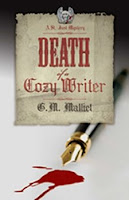Sparking Your Creativity
an artist and creative person, I can experience times when I reach
down for ideas, for creative excitement, for images, and come up
temporarily empty. These have usually been times that have combined
lots of creative overwork and lots of business work—taxes,
promotion, correspondence, contracts, freelance editing, etc. This
kind of emptiness and feeling creatively dry can be terrifying, but
I’m now used to it, and I know what to do to refill the well and
spark new creativity. In these circumstances, it’s necessary to
take time to do things to build up new creativity energy within you.
So here are ten ideas to get you started.
Writing—This is the backbone of the creative life, especially for
writers. I’m not necessarily talking about a daily diary. This is a
notebook in which you write about what you see and hear, turning it
into dialogue or sensory description. This is where you can work with
writing prompts from books, workshops, tapes, and DVDs, your version
of the pianist’s daily scales. Set a kitchen timer for a few
minutes and do some freewriting to unload some of the chattering of
your surface mind and move into deeper ideas.
Poetry—I’m a poet, as well as a novelist, but I’ve been
surprised by how many commercially successful novelists I’ve met
who say they regularly or occasionally read poetry as a springboard
for their writing. It actually makes great sense because the poet
deals in imagery, which is the language of the right (creative)
brain. I know that, whenever I read poetry, it sets my
mind whirling with tons of ideas and images. I have come up with
ideas for entire novels from reading a poem.
Something Very Different for You—If you always read and write
poetry, check out a popular novel. If you’re a mystery reader, take
a look at what science fiction writers are coming up with. If you
read and write literary fiction, pick up a romance novel. Jog your
mind from its habitual ruts of thinking and imagining. Stretch out of
your comfort zone. Even if you don’t like what you read, it should
still shake up your mind enough to start generating ideas, images,
and characters.
Brainstorming—Most of us have been taught how to do and forced to
sit through group brainstorming sessions before. Take those
techniques and a sheet of paper with pen (or iPad or laptop), get
comfortable, set a timer again, and start throwing out ideas at top
speed. Same rules as with the group process. You can’t disqualify
any idea, no matter how unrealistic. You want to generate as many
ideas as you can as quickly as you can. Just list them down the
page—or even use a voice recorder to capture them. After
the timer goes off, you can go down the list considering the
possibilities you’ve listed. Look for possibilities to combine
aspects of ideas. Write down any new ideas that get sparked by your
consideration of the ideas already down on the page. Choose one or
two promising (or least abhorrent) ideas and freewrite about them in
your journal.
Lists—I love listmaking. Make lists of ideas, of characters, of
backgrounds you’d like to use someday, of isolated bits of dialogue
or description, of actions you’d like to see a character to take.
My favorite is to write a list of scenes I’d like to read—exciting
scenes, action-filled scenes, emotional scenes, surprising scenes,
suspenseful scenes. They don’t have to have anything to do with any
project you’re working on or any character you are writing or have
written. They just need to be scenes you’d love to read—because
scenes you’d love to read are scenes you’d love to write.
a Museum, Gallery, Play, Film, Concert—We writers live and breathe
words. Sometimes we need to get out of our heads and see or hear art
that isn’t primarily word-based. It can be especially fruitful to
go to a film in a language you don’t understand or an art exhibit
of a kind you know nothing about. When we have no words to use to
explain or understand what we’re seeing, our brains are kicked into
another mode of functioning that can become quite generative. Wander
around a gallery or museum and take in the colors and shapes. Sit in
a concert hall or movie theater and let the music or film engulf you
completely, washing through your brain. Come out seeing or hearing in
a slightly different mode.
Paint, Knit, Spin, Sew—Even better than looking at art is making
it. Sink your hands into clay or fiber. Splash ten different colors
next to each other, taking note of the changes each new color
creates. Feel the texture of the fabric, thread, yarn, fiber as you
work with it to make something new. Take a penciled line and see what
you can create with it. All of this also kicks in the right brain,
the imagistic, creative part of us. Stay in beginner mind without
worrying how “good” your art will be. This is—and should
be—play, completely carefree and innocent.
for a Walk—Physical exercise is always a good thing for us
sedentary word slugs, but even more important than its many health
benefits are the creative benefits of simply moving your body through
space. As you move around, your brain begins to get unstuck and to
move, as well. A nice, long walk outdoors (preferably in scenic
surroundings) can often jumpstart the solution to a creative dry
spell. Sometimes a sterile period can arise from being overstressed.
Walks are one of the best ways to counter such stress and relax the
mind and body.
Flowers/Rearrange Some Belongings—In the Chinese art of feng shui,
rearranging 27 items will start stuck soul energy flowing again.
Moving belongings into new configurations, trying for a more pleasing
pattern, has long been a cure for the blues and the blahs. We are
pattern-recognizing and pattern-creating organisms. To change the
habitual patterns that surround us charges us with new energy. A
smaller, simpler version of this is to gather or buy some flowers and
assemble them into flower arrangements that please our aesthetic
sensibilities. Spending a little time in creating pleasing, artistic
arrangements of flowers or accessories will provide a creative boost
to stuck energies.
to Lunch with a Creative Friend or Two—Everyone has one or more
friends or acquaintances who are creative sparklers. Like the child’s
fireworks favorite, they give off showers of sparks, or creative
ideas, constantly. They are positive and upbeat and always focused on
possibilities. Spending some time with them will leave you filled
with ideas, energy, and excitement. It’s always worthwhile to give
them a call and set up a relaxed lunch in a nice place. Rather than
complain about how dry and sterile things are for you right at the
moment, ask them what’s new with them and what they see as
possibilities for the future. As they take off shooting
into the blue yonder, follow them wholeheartedly and build on all
their ideas. You’ll walk away at the end of lunch with a big smile
on your face and a bunch of ideas bubbling in your unconscious.
Cherish these friends, even if they are unrealistic and immature.
Their wild, creative energy is invaluable when your own has
temporarily deserted you.
or more of these ten methods should start your creative powers
working once again. I’ve never had to go through more than a couple
of these at a time to get my creative mojo stirring. Post this list
near your desk, and don’t spend any time or energy bewailing it
when a creative dry spell hits. Just reach for this and try whichever
of these ideas looks most appealing at the time. If the first doesn’t
completely prime your creative pump, move to another of them.
Creativity never leaves, but sometimes it needs a spark to start the
engine running again. So spark your creativity!





